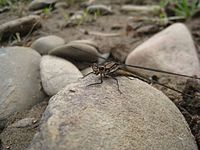Diphlebia nymphoides
Appearance
| Arrowhead rockmaster | |
|---|---|

| |
| Diphlebia nymphoides | |
| Scientific classification | |
| Domain: | Eukaryota |
| Kingdom: | Animalia |
| Phylum: | Arthropoda |
| Class: | Insecta |
| Order: | Odonata |
| Suborder: | Zygoptera |
| Family: | Lestoideidae |
| Genus: | Diphlebia |
| Species: | D. nymphoides
|
| Binomial name | |
| Diphlebia nymphoides | |

| |
Diphlebia nymphoides is a species of Australian damselfly in the family Lestoideidae,[3] commonly known as an arrowhead rockmaster.[4] It is endemic to eastern Australia, where it inhabits streams and rivers.[5]
Diphlebia nymphoides is a large, solid-looking damselfly; the adult male is a brilliant blue colour with a black and blue striped tail, while the female has a more muted colouring. It sits with its lightly tinted wings spread out.[6]
Gallery
[edit]-
Male Diphlebia nymphoides
-
Male detail
-
Detail of male tail
-
Face on
-
Female wings
-
Male wings
See also
[edit]References
[edit]Wikimedia Commons has media related to Diphlebia nymphoides.
- ^ Dow, R.A. (2017). "Diphlebia nymphoides". IUCN Red List of Threatened Species. 2017: e.T14275570A59256628. doi:10.2305/IUCN.UK.2017-1.RLTS.T14275570A59256628.en. Retrieved 20 November 2021.
- ^ Tillyard, R.J. (1912). "On the genus Diphlebia, with descriptions of new species, and life-histories". Proceedings of the Linnean Society of New South Wales. 36 (1911): 584–604 [588].
- ^ "Species Diphlebia nymphoides Tillyard, 1912". Australian Faunal Directory. Australian Biological Resources Study. 2012. Retrieved 11 April 2017.
- ^ Theischinger, Günther; Hawking, John (2006). The Complete Field Guide to Dragonflies of Australia. Collingwood, Victoria, Australia: CSIRO Publishing. p. 18. ISBN 978-0-64309-073-6.
- ^ Theischinger, Gunther; Endersby, Ian (2009). Identification Guide to the Australian Odonata (PDF). Department of Environment, Climate Change and Water NSW. p. 211. ISBN 978-1-74232-475-3.
- ^ Watson, J.A.L.; Theischinger, G.; Abbey, H.M. (1991). The Australian Dragonflies: A Guide to the Identification, Distributions and Habitats of Australian Odonata. Melbourne: CSIRO. ISBN 0643051368.







